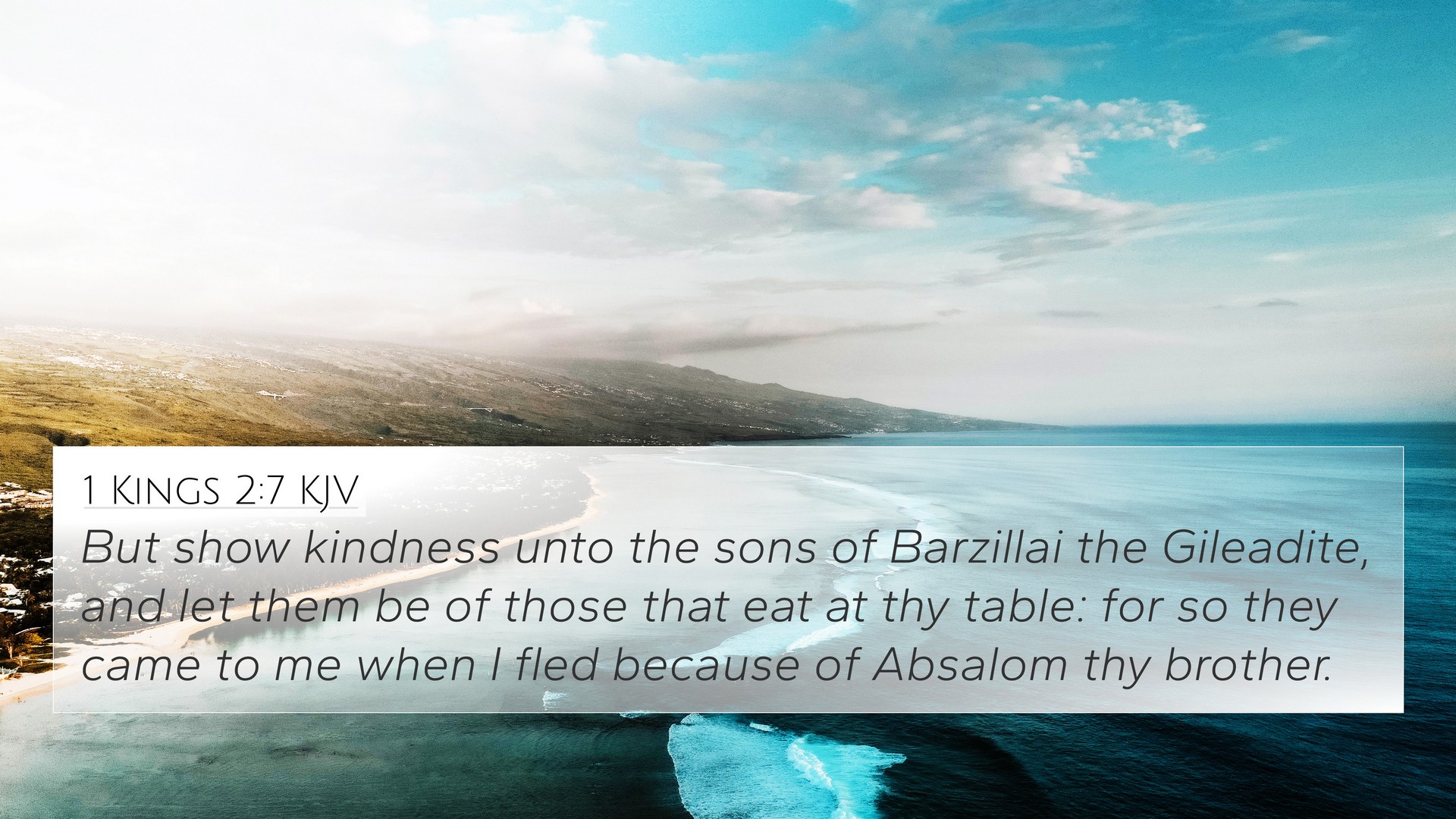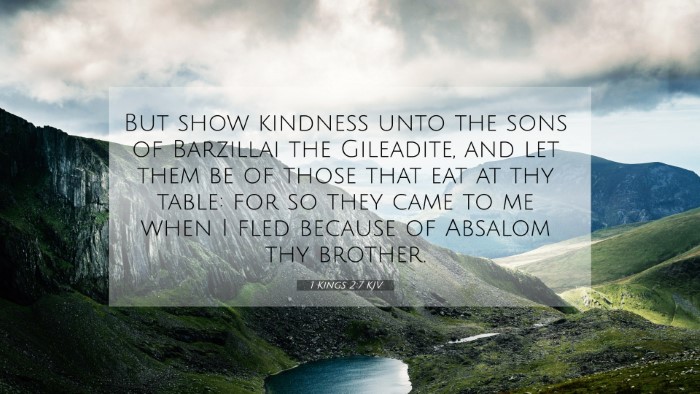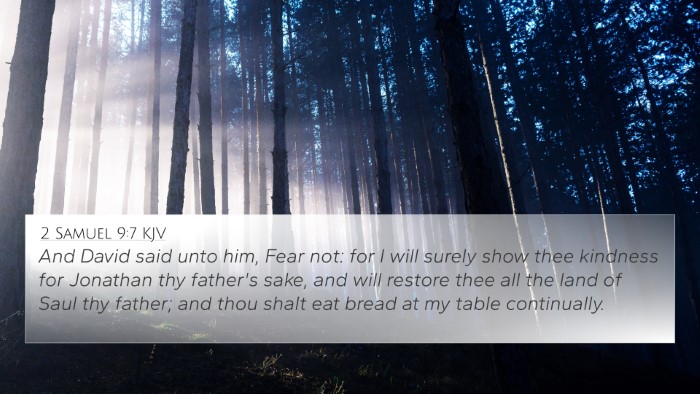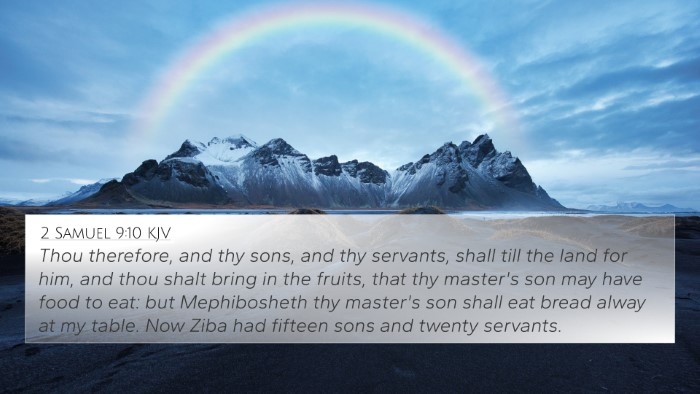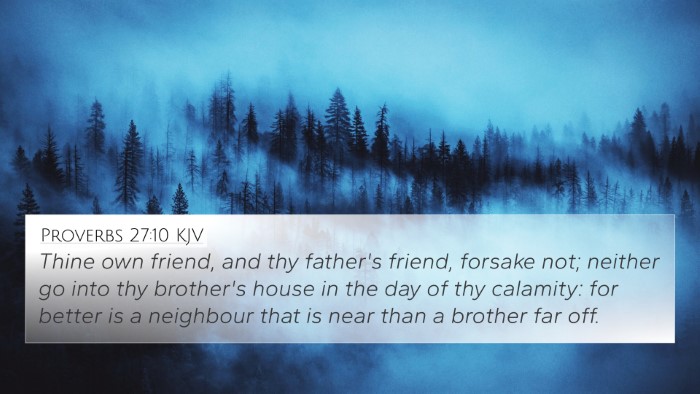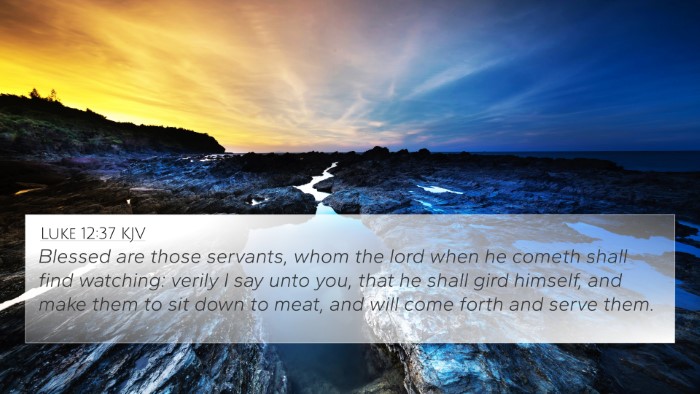Understanding 1 Kings 2:7
This verse plays a critical role in the narrative of King David's final instructions to Solomon, emphasizing the importance of mercy and loyalty within familial and covenantal relationships. In this passage, David advises Solomon to show kindness to the sons of Barzillai the Gileadite as a reward for their support during his time of need.
Contextual Background
In chapter 2 of 1 Kings, we find King David at the end of his life, transitioning power to his son Solomon. This moment is laden with significance as it carries the weight of royal duty, familial obligation, and divine promise. The context highlights the pivotal role of covenantal faithfulness and the importance of honoring those who were loyal during times of distress.
Verse Text
1 Kings 2:7 (KJV): But shew kindness unto the sons of Barzillai the Gileadite, and let them be of those that eat at thy table: for so they came to me when I fled because of Absalom thy brother.
Meaning and Interpretation
The verse illustrates the following themes:
- The Importance of Kindness: David emphasizes the value of kindness and gratitude towards those who have aided us in times of adversity. Commentators suggest that this sets a precedent for righteous leadership, where the king honors those loyal to him.
- Memorializing Loyalty: Barzillai's loyalty during David's abdication underscores the significance of remembrance in leadership. It serves as a model for Solomon to emulate.
- Family Dynamics: This instruction reflects on the complexities of familial relationships and the need for mutual respect and loyalty, promoting peace in the transition of power.
- God's Covenant and Mercy: David's appeal for mercy evokes the broader biblical theme of God's covenant love and faithfulness, showcasing the necessity of extending mercy and unity, values critical to God’s people.
Commentary Insights
Insights from prominent public domain commentaries further illuminate this passage:
- Matthew Henry: Henry highlights that this act of kindness reflects God's own grace. David’s request for Solomon to honor Barzillai is a testament to his appreciation of the blessings of loyal friendship during turbulent times, encouraging future leaders to act similarly.
- Albert Barnes: Barnes points out that the request conveys both a personal and political significance, suggesting David’s desire for Solomon to build alliances to secure his reign.
- Adam Clarke: Clarke emphasizes the need for Solomon to be wise in choosing his associates, urging him to establish a loyal counsel and appreciate those who have provided support.
Bible Cross-References
This verse relates to several other biblical passages that underscore similar themes of loyalty, kindness, and covenant faithfulness:
- 2 Samuel 19:31-39: This passage recounts Barzillai's earlier support for David, which clarifies his significance in David’s life.
- Proverbs 3:3: Encouragement to bind mercy and truth around the heart, reflecting the essence of kindness.
- Luke 6:36: Jesus’ teaching on being merciful as the Father is merciful, illustrating the continuity of kindness throughout scripture.
- James 2:13: "For judgment is without mercy to the one who has shown no mercy," reinforcing the essence of mercy in human interactions.
- Matthew 25:40: "Inasmuch as you did it to one of the least of these, you did it to me," highlighting the importance of kindness to others.
- Galatians 6:10: Encourages the faithful to do good to all, especially fellow believers, emphasizing community bonds.
- 1 Peter 3:8: Calls for unity and compassion among believers, aligning with David's instruction to Solomon regarding Barzillai’s sons.
Conclusion
1 Kings 2:7 serves as a poignant reminder of the significance of kindness, loyalty, and covenant fidelity in leadership and personal relationships. Through this verse, we see how interwoven the themes of grace, mercy, and familial duty are throughout the Biblical narrative. Understanding these themes can be further explored through the use of tools for Bible cross-referencing, providing a rich tapestry of scripture that informs our understanding of God's character and our response to one another.
